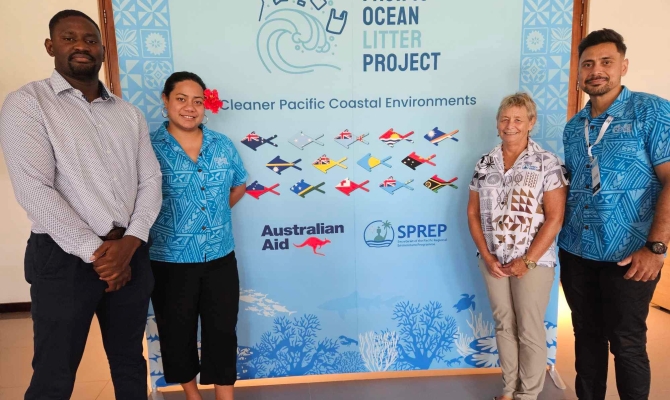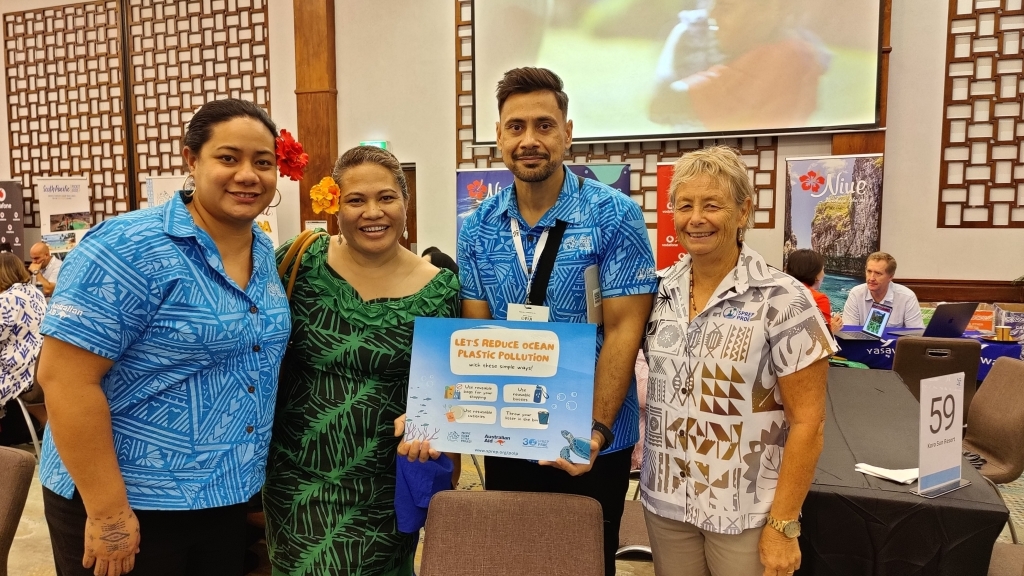
10 May 2024, Denarau, Fiji - The Secretariat of the Pacific Regional Environment Programme (SPREP) actively participated in the 8th South Pacific Tourism Exchange (SPTE), hosted by the Pacific Tourism Organization (SPTO) at the Sheraton Fiji Golf and Beach Resort in Denarau, Fiji, from May 4-5, 2024.
It was the first time a strong representation from SPREP’s technical programmes had been part of SPTE, presenting a unique opportunity to strengthen the CROP partnership with SPTO on environmental sustainability.
The Pacific tourism sector is experiencing significant growth and expansion, with stakeholders expressing keen interest in further developing the industry.
The SPTE is the premier Pacific travel trade show organised by SPTO to present a cost-effective platform for its Pacific Island partners to travel from all corners of the Pacific Ocean to the region to exchange their exciting products with international buyers from across the globe.
During his opening remarks, the CEO of SPTO, Mr Christopher Cocker, recognised the significance of the event, stating:
“We have buyers from all across the globe including Europe, Asia, the United States, Canada, Australia and New Zealand as well as 69 sellers from 16 Pacific Island Countries, 6 media and of course all our wonderful partners and sponsors joining this event today”.

SPREP representation at the SPTE provided a unique opportunity to engage with industry stakeholders from across the globe, discussing how SPREP initiatives are driving sustainability and resilience in the sector in alignment with the SPREP Strategic Plan 2017-2026 and Pacific Sustainable Tourism Policy Framework 2030.
The Australian government funded Pacific Ocean Litter Project (POLP) of the Waste Management and Pollution Control (WMPC) programme, a partner of the SPTE event, raised awareness on the project, including an initiative to promote sustainability and resilience in the sector through a standards and certification program to reduce single-use plastics. The programme will be developed and implemented through the SPTO.
According to POLP Project Coordination Officer, Mr Dwayne Bentley, “a key objective of the partnership with SPTO is ensuring a fit-for-purpose programme that recognises the Pacific context to support industry in reducing its use of certain single-use plastics and replacing these with environmentally friendly substitutes”.
SPREP also showcased the suite of Regional Environmental Impact Assessment tools developed by the Environmental Monitoring and Governance Programme to guide sustainable tourism investments and developments in the Pacific. These tools include the EIA Coastal Tourism Guidelines for the Pacific and the newly developed Environmental Auditing Guidelines for Tourism Accommodations in the Pacific which provide a framework for assessing the environmental impacts of coastal tourism initiatives on the environment and communities and identifying areas for improvement.
There was also keen interest in the Regional Marine Tourism Guidelines and code of conduct being developed by the Island and Ocean Ecosystems (IOE) programme through the European Union-funded Pacific BioScapes Program. These guidelines intend to build on global best practice and provide guidance to marine tourism operators on appropriate interactions with marine species relating to whales and dolphins, sharks and rays, marine turtles, dugong, and seabirds in the Pacific to ensure that these activities do not contribute to disturbance and population declines.
SPREP's participation in the SPTE was well-received and recognised by members and industry stakeholders and demonstrates the organization’s commitment to collaborating with regional partners and stakeholders to continue promote sustainable tourism practices and ensure the long-term resilience of the Pacific's unique ecosystems and communities.
The Pacific Ocean Litter Project is an initiative to assist Pacific Island countries reduce single-use plastic marine litter in its coastal environments. It supports the phasing out of specific types of single-use plastics from land-based sources, including household litter and tourism waste.
For more information on SPREP’s engagement at the SPTE, contact; Dwayne Bentley, POLP project co-ordination Officer ([email protected]), Karen Baird, Threatened and Migratory Species Adviser ([email protected]) or Ivan Diarra, Pacific Network for Environmental Assessment Technical Officer ([email protected]).